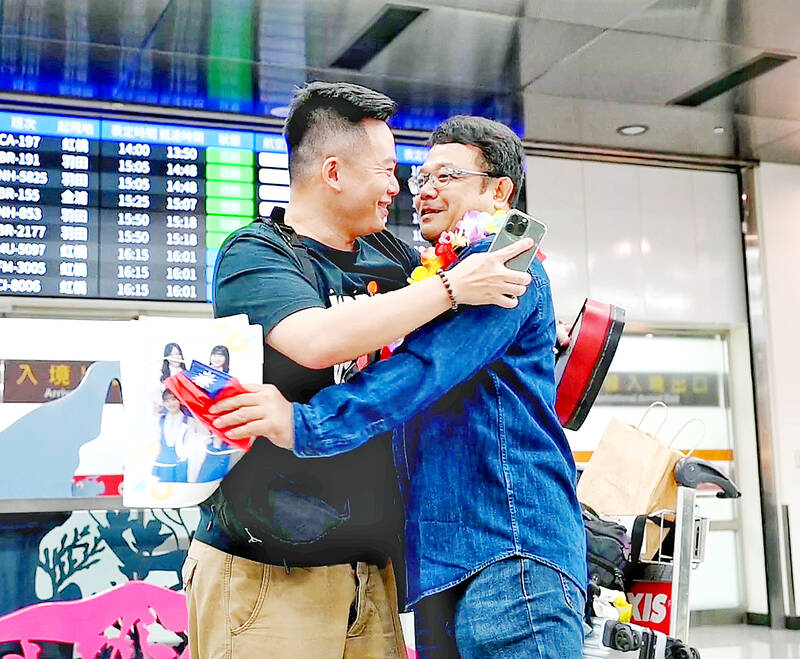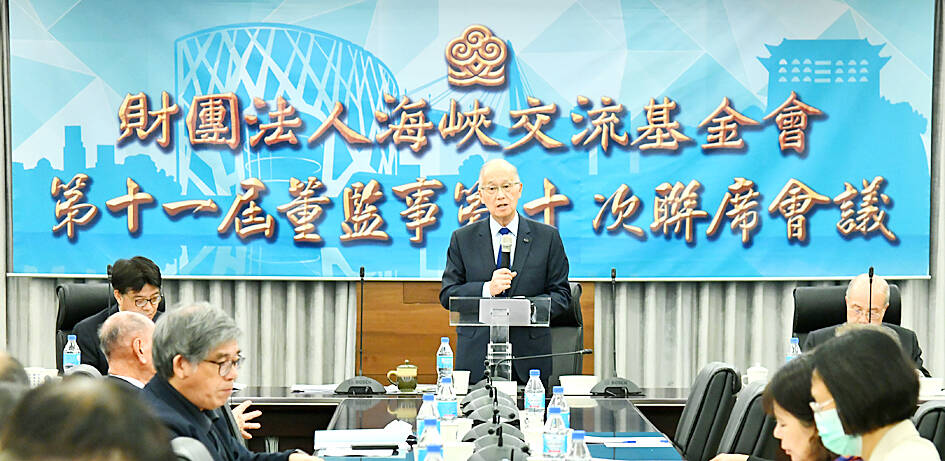Morrison Lee (李孟居), who was imprisoned in China for 22 months on spying charges, arrived in Taiwan yesterday.
Lee knelt to kiss the ground twice upon his arrival at Taipei International Airport (Songshan airport), saying that he was overcome with joy to return after 1,475 days.
“This is the land of freedom,” he said. “I will never go to China again.”

Morrison Lee, right, is greeted by a family member upon his return to Taiwan at Taipei International Airport (Songshan airport) yesterday.
Photo: Fang Pin-chao, Taipei Times
“I will use my experience to tell Taiwanese: If you go to China, Hong Kong or Macau, you really must be very careful,” he told reporters.
Lee was an unpaid adviser to Pingtung County’s Fangliao Township (枋寮) when he was arrested in 2019 while traveling from Hong Kong to Shenzhen for business.
He was convicted on espionage charges and handed a 22-month sentence. After completing the sentence in 2021, the Chinese government prohibited him from leaving China for two more years.

Straits Exchange Foundation Chairman David Lee speaks at the foundation’s board meeting in Taipei on Friday.
Photo courtesy of the Straits Exchange Foundation
He was allowed to leave in July, but was not allowed on a flight to Taiwan, so he flew to Japan, where he stayed until yesterday.
On Friday, Straits Exchange Foundation Chairman David Lee (李大維) said that China’s Counter-Espionage Law is not conducive to stable cross-strait exchanges.
Exchange programs and reciprocal visits have restarted with the easing of COVID-19 restrictions and the Mainland Affairs Council (MAC) has announced measures to open up to Chinese tourists.
“Tourism and people-to-people interactions are the best ways to bolster mutual understanding between the two sides, but China on July 1 promulgated a revised Counter-Espionage Law, which has new provisions that substantially expand the scope of activities that Chinese authorities consider espionage,” David Lee said.
Media have reported cases of Taiwanese being confined in China or facing “unfriendly treatment,” he said. “The Chinese government should know that such incidents are not conducive to cross-strait peace and stability.”
“Taiwanese should exercise caution in their speech and action while in China to avoid breaching its laws,” he added.
China is facing an economic crisis, with Chinese property developers defaulting on debts among the financial woes, while the youth unemployment rate has been climbing for six months, reaching 21.3 percent in June, David Lee said.
Beijing in July stopped releasing youth unemployment data, so the actual situation might be even worse, he said.
Separately, a national security official warned Taiwanese about traveling to Chongqing, which on Friday promulgated a Counter-Espionage Regulation.
It is the first local law that connects to the central government’s Counter-Espionage Law, giving the megacity the legislative instrument to fight spying by Chinese and foreigners, said the official, who declined to be named.
The regulations allow Chinese authorities to “make arbitrary arrests,” creating a “minefield” for Taiwanese, the official said.
The MAC last week issued a warning to Taiwanese, listing things they should refrain from saying in China, as they can be interpreted as “attempting to obtain state secrets” or “spying activities,” the official said.
The decision to stop releasing data on youth unemployment, as well as real-estate, foreign direct investment, stock market trading, COVID-19 deaths, unfavorable information about Chinese academia, and personal information about Chinese politicians are topics to avoid, the official said.
Source: Taipei Times - 2023/09/03




















